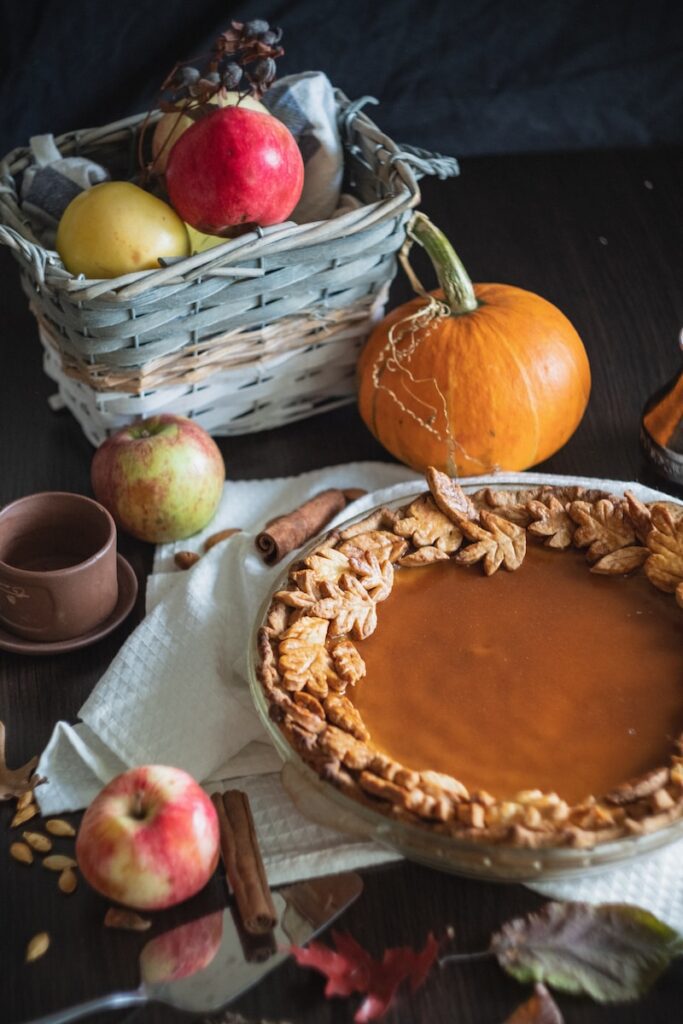When it comes to festive foods, few treats encapsulate the essence of fall quite like pumpkin pie. But have you ever wondered about the nutrition facts of this classic dessert? Here’s a deep dive into the dietary details of a serving of pumpkin pie.
Core Components of Pumpkin Pie
Calories and Macronutrients
A typical serving size of pumpkin pie, which is usually about a slice, contains around 320 calories. While calorie count is pivotal in a daily diet, it’s also essential to understand the breakdown of these calories. The pie is primarily comprised of carbohydrates, with around 46 grams per serving. Of these carbs, sugars account for approximately 22 grams, while the remaining are a mix of other carbohydrates and dietary fiber.
Fats and Proteins
Fat plays a significant role in pumpkin pie’s rich texture. A single serving contains about 14 grams of fat. Of this, 5 grams are saturated fats, and the rest are a combination of mono and polyunsaturated fats. On the protein front, a slice offers about 6 grams, making it a decent source of protein for a dessert.
Vitamins and Minerals
Pumpkin is a powerhouse when it comes to vitamins. Most notably, vitamin A shines, with pumpkin pie providing a substantial amount in each slice. There are also smaller amounts of various B vitamins, vitamin C, and vitamin E. When it comes to minerals, the pie provides potassium, calcium, iron, and a small amount of sodium.
Dietary Considerations
For those watching their diet and weight, it’s vital to note the sugar and saturated fat content. While the pie is nutritious in many ways, the sugars and saturated fats can be a concern for some diets. Thus, moderation is key.

How Does Pumpkin Pie Compare to Other Foods?
While pumpkin pie is a treat, it’s interesting to see how it compares with other foods, especially when considering its nutrition facts.
Pumpkin Pie vs. Other Desserts
Compared to many sugary desserts, pumpkin pie has a lower sugar content. That’s because the primary ingredient, pumpkin, is naturally sweet. This reduces the need for additional sugars. Also, the dietary fiber in pumpkin pie is higher than many other desserts, making it a more filling option.
Pumpkin Pie in a Balanced Diet
Incorporating pumpkin pie into a balanced diet can be done sensibly. Given the calorie, carbohydrate, and sugar content, it’s a food best enjoyed occasionally. Yet, with its rich vitamin and mineral profile, it certainly offers more nutrition than many other desserts.
Tips for a Healthier Pumpkin Pie
Reducing Sugars and Fats
For those keen on enjoying pumpkin pie while also keeping an eye on their diet, there are ways to make it healthier. One can reduce the amount of sugar in the recipe or use alternatives like honey or maple syrup. The fat content, primarily from the crust and filling, can also be modified. Using a crust with reduced butter or opting for low-fat condensed milk can make a difference.
Enhancing Nutritional Value
Adding nuts or seeds can boost the protein and healthy fat content. Incorporating flaxseeds or chia seeds can also increase the dietary fiber, making the pie even more filling and nutritious.
In conclusion, while pumpkin pie is undoubtedly a delicious food, it’s also packed with nutrition. From its vitamin-rich pumpkin base to its carbohydrate, sugar, and fat content, understanding the nutrition facts can help individuals make informed dietary choices. So, the next time you savor a slice, you’ll appreciate not just its taste but also its place in your daily diet.
FAQs
- Is pumpkin pie healthy or unhealthy? Pumpkin pie, when consumed in moderation, can be considered healthy due to its vitamin and mineral content, including potassium, calcium, and iron. However, its calorie, sugar, and fat content, especially saturated fats, can make it less suitable for daily consumption.
- Is pumpkin pie the healthiest pie? While pumpkin pie contains beneficial vitamins and minerals, its healthiness is relative to other pies. Based on its vitamin content, particularly vitamin A, and the presence of fiber, it can be one of the healthier pie options. However, comparing pies requires considering individual ingredients and nutritional facts.
- Is pumpkin pie high in calories? Pumpkin pie does have a considerable calorie content, with one slice typically containing around 320 calories. The exact calorie count can vary based on size and recipe.
- Is pie a junk food? The classification of pie as a junk food depends on its ingredients. While pies, in general, might be higher in sugar, carbs, and fats, they can also provide nutritional benefits like vitamins and minerals. Thus, it’s essential to evaluate each pie based on its nutritional facts.
- Which pie is the healthiest? The healthiest pie would be one with minimal added sugars, reduced saturated fats, and high in vitamins, fiber, and other beneficial nutrients. While pumpkin pie is relatively healthy, pies made from berries or other fruits might also be nutritious based on their ingredients.

